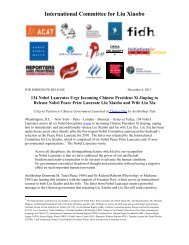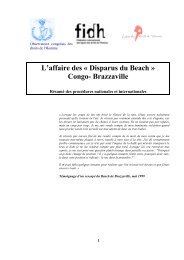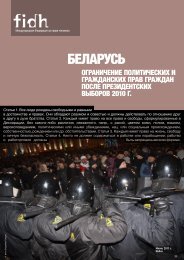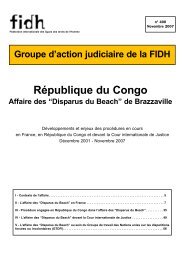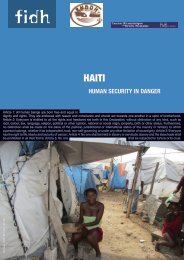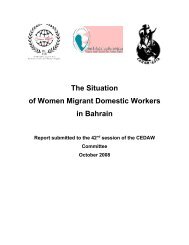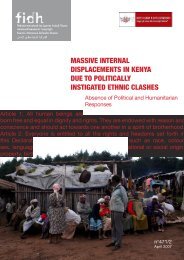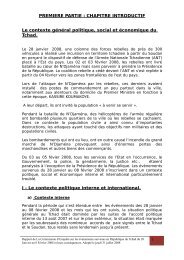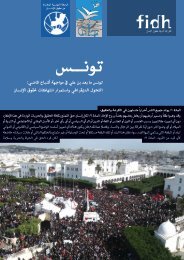You also want an ePaper? Increase the reach of your titles
YUMPU automatically turns print PDFs into web optimized ePapers that Google loves.
2. Severe violations of the rights of migrants and refugees in <strong>Libya</strong> beforethe conflictPrior <strong>to</strong> the recent rebellion, migrants arriving in or transiting through <strong>Libya</strong> were regularlyvictims of serious human rights violations, including physical violence, arbitrary arrests anddetention and forced returns. Migrants in an irregular situation were often arrested and detainedin camps, in terrible conditions, sometimes for many years. Others were expelled <strong>from</strong> <strong>Libya</strong>,in violation of international law and the principle of non-refoulement.<strong>Libya</strong> has never ratified the UN Convention on the Status of Refugees of 1951 and does nothave a system guaranteeing the right <strong>to</strong> asylum. Registration of asylum seekers, documentationactivities and refugee status determination procedures were carried out by the UNHCR untilJune 2010, when the body was expelled by the <strong>Libya</strong>n government without explanation.This coincided with the beginning of negotiations between <strong>Libya</strong> and the European Unionon the conditions and amount of an assistance fund <strong>to</strong> be granted <strong>to</strong> <strong>Libya</strong> for the purpose offighting irregular migration 1 . This policy, under which the EU made Gaddafi a partner in fightingirregular migration in<strong>to</strong> Europe and ignored the grave human rights violations committed againstmigrants in <strong>Libya</strong>, formed part of the EU’s general policy of externalising border controls 2 .3. Allowed across the <strong>Libya</strong>n border only <strong>to</strong> remain in transitThe geography of <strong>Libya</strong>, vast expanses of desert with populated areas located mainly alongthe Mediterranean, explains the fact that the exodus has been concentrated at the Tunisian and<strong>Egypt</strong>ian borders (about 582,812 and 358,088 entries in Tunisia and in <strong>Egypt</strong> respectively sincethe conflict began as of 20 June 2011), while smaller numbers have fled across the southernborders with Chad and Niger. 3The <strong>Egypt</strong>ian and Tunisian governments have maintained their borders open <strong>to</strong> those <strong>flee</strong>ing<strong>Libya</strong>. But for most migrants admission in<strong>to</strong> the country does not mean the right <strong>to</strong> stay. Withthe exception of those with <strong>Libya</strong>n nationality, who until now have been allowed <strong>to</strong> settletemporarily in Tunisia and <strong>Egypt</strong>, nationals of other countries are kept in border areas pendingevacuation <strong>to</strong> their countries of origin or - for refugees who cannot return home - resettlementin host countries. The IOM and the UNHCR are responsible for coordinating humanitarianassistance in border areas and organizing departures.4. <strong>FIDH</strong>’s fact-finding mission at the <strong>Egypt</strong>ian-<strong>Libya</strong>n borderAlerted by information on the precarious situation of refugees and migrants stranded at the<strong>Egypt</strong>ian/ <strong>Libya</strong>n border at Salloum and by reports of acts of violence specifically targetingimmigrants <strong>from</strong> Sub-Saharan Africa in <strong>Libya</strong>, <strong>FIDH</strong> sent a fact-finding mission <strong>to</strong> the borderwith two main objectives:• To document the situation of the exiles at the border;• To collect direct testimony <strong>from</strong> exiles on their experiences in <strong>Libya</strong> since the outse<strong>to</strong>f the conflict.1. The National Indicative Programme for <strong>Libya</strong> 2011-2013 negotiated between the EU and <strong>Libya</strong>, includes the fight against illegalmigration as one of its three priorities. The budget proposed by the EU for the programme was 60 million euros.2. See further <strong>FIDH</strong> and UFTDU press statement (in French), Libye/UE : La <strong>FIDH</strong> et l’UFTDU condamnent les propos racistes du ColonelKhadafi, 30 septembre 2010, http://www.fidh.org/Libye-UE-La-<strong>FIDH</strong>-et-l-UFTDU-condamnent-les-propos3. See IOM situation reports http://www.iom.int/jahia/Jahia/lang/fr/pid/1.<strong>FIDH</strong> – EXILES FROM LIBYA FLEE TO EGYPT / 5




